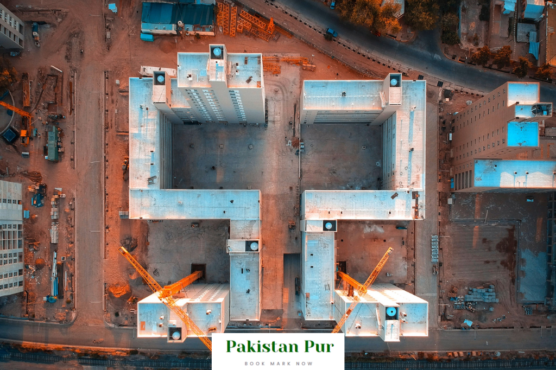
Table of Contents
Civil Engineering is a professional discipline that deals with the design, construction, and maintenance of the physical and naturally built environment.
The Bachelor of Science in Civil Engineering (BS or BE Civil Engineering) in Pakistan is an academically rigorous program that equips students with the knowledge and skills to solve complex civil engineering problems.
BS Civil Engineering is a 4-year, 8-semester program in Pakistan
This course offers a comprehensive understanding of the fundamentals of civil engineering, including structural geology, construction safety standards, and building regulations.
Students receive hands-on training on constructing buildings, dams, tunnels, and disaster control systems. The program also focuses on strengthening the field of Irrigation Engineering, particularly in undeveloped areas of Pakistan.
As a result, BSCE graduates are highly sought after for their expertise and ability to contribute significantly to the country’s infrastructural development.
Civil Engineering is one of the top fields after FSc Pre Engineerings. Read the full list of best fields after FSc Pre Engineering here.
Best Fields after FSc Pre Engineering in Pakistan

Scope of Civil Engineering in Pakistan
Civil Engineering holds great promise in Pakistan, with a burgeoning demand linked to an increase in housing projects and town schemes.
This field, pivotal for infrastructural development, encompasses designing, constructing, and maintaining physical structures. Civil engineers play crucial roles in management, planning, supervision, and construction sectors.
As Pakistan develops, the need for skilled civil engineers escalates, making this one of the most in-demand professions in the country.
Let’s explore the scope of civil engineering in Pakistan in more detail.
Industries for BS Civil Engineering Graduates
These industries have a higher demand for civil engineers. Since civil engineers have a role whenever there is some construction or designing, many other industries also demand civil engineers.
- Construction Industry: The cornerstone of civil engineering, this industry involves the design, planning, and construction of various infrastructure projects like buildings, roads, and bridges.
- Government Sector: Local and national government departments frequently employ civil engineers for public works projects, which can range from highways and airports to water treatment plants and public housing.
- Consultancy Firms: These firms provide expert advice on design, sustainability, and project management. Civil engineers in consultancy roles help clients navigate the complexities of planning and executing construction projects.
- Transportation Industry: This sector relies on civil engineers for the design and construction of transport infrastructure such as highways, railroads, and airports, ensuring efficient and safe transportation systems.
- Energy Sector: Civil engineers play a key role in power generation and distribution projects, including the construction of power plants, wind farms, and oil/gas pipelines.
- Environmental Engineering: A specialized field within civil engineering, environmental engineers develop and implement solutions to environmental problems, including designing systems for waste disposal, water treatment, and air pollution control.
- Geotechnical Engineering: In this field, civil engineers analyze soil and rock mechanics to determine the suitability of locations for construction and design foundations and earthworks.
Career for BS Civil Engineering Graduates
This is a brief list of Careers for BS Civil Engineering Graduates. There are many other career paths available for civil engineers. I suggest you look into job boards like Indeed or government agencies’ websites to see the career paths for civil engineers. Rest assured, the careers of civil engineers are abundant.
- Building Services Engineer: In this role, you’ll design, install, and maintain essential services such as heating, lighting, and air conditioning in buildings.
- Construction Manager: As a Construction Manager, you’ll be responsible for planning, coordinating, budgeting, and supervising construction projects from the early development stage to final delivery.
- Engineering Geologist: This role involves applying geological data, techniques, and principles to the study of rock and soil materials, and groundwater for the design and construction of civil engineering structures.
- Fire Risk Assessor: Fire Risk Assessors evaluate buildings for fire safety, ensuring compliance with all relevant regulations and standards.
- Geotechnical Engineer: In this role, you’ll investigate and assess construction sites, conduct lab tests, create designs and plans, and often manage construction projects.
- Patent Attorney: Patent Attorneys are legal experts who help inventors and businesses obtain patents to protect their inventions and intellectual property.
- Quantity Surveyor: As a Quantity Surveyor, you’ll manage all costs related to building and civil engineering projects, from the initial calculations to the final figures.
- Environmental Engineer: Environmental Engineers use their knowledge of engineering, soil science, biology, and chemistry to solve environmental problems.
- Structural Engineer: Structural Engineers analyze, design, plan, and oversee the construction of new buildings and bridges, or alterations and extensions to existing properties or other structures.
- Design Engineer: Design Engineers research and develop ideas for new products and systems. They also work to improve the performance and efficiency of existing products.

BS Civil Engineering Salary in Pakistan
A Civil Engineer typically earns around 75,700 PKR per month. However, this can range from 35,600 PKR at the lowest end to as much as 120,000 PKR at the highest end.
With a Bachelor’s degree, a Civil Engineer can expect to earn an average annual salary of 751,700 PKR. It’s important to note that these figures can be influenced by factors such as location, years of experience, and level of education.
Further Education after BS Civil Engineering
With education, you should think of a lifetime and see how you will end up 30 years later. In that journey, education is your most important tool.
Here are some ways you can grow in civil engineering by advancing your education.
- Master’s Degree in Civil Engineering: This advanced degree allows for specialization and offers a deeper understanding of civil engineering concepts. It involves two years of rigorous coursework and research, preparing you for more complex roles in the industry.
- Doctorate Degree (Ph.D.) in Civil Engineering: Pursuing a Ph.D. in Civil Engineering is an opportunity to contribute original research to the field. It typically takes four to six years and is ideal for those interested in academia or high-level research positions.
- Professional Engineering (PE) License: Earning a PE license is a significant professional achievement that allows civil engineers to offer their services directly to the public. The process involves passing two exams and gaining several years of work experience.
- Specialized Certifications: Certifications such as the Project Management Professional (PMP) or Leadership in Energy and Environmental Design (LEED) can showcase your expertise in a specific area, making you stand out in the job market.
- MBA (Master of Business Administration): An MBA can equip civil engineers with business and management skills, which are beneficial for those aspiring to leadership roles or those planning to start their own engineering firm.
Civil Engineering Scope In Pakistan For Females
Civil Engineering is a promising field in Pakistan, with increasing opportunities for women. As the country develops its infrastructure and construction sectors, the demand for civil engineers, including female engineers, continues to rise.
Opportunities in Various Sectors
A career in civil engineering can lead to positions in various sectors:
- Government Departments: Women can work in different government sectors related to infrastructure, housing, and urban development.
- Private and Public Sector Undertakings: There are numerous private and public companies hiring civil engineers for their projects.
- Real Estate Societies: Real estate development is booming in Pakistan, offering ample opportunities for civil engineers.
- Consultancy Firms: Many consultancy firms require civil engineers to provide expert advice on different projects.
Job Opportunities for Female Civil Engineers
As of August 2023, there were several job openings specifically for female civil engineers. Positions ranged from Civil Engineer, Electrical Engineer, Research and Development Engineer to Senior Lab Engineer in Civil Engineering. This indicates an encouraging trend towards gender inclusivity in the field.
Successful Female Civil Engineers in Pakistan
Pakistan is home to some brilliant female civil engineers who have made significant contributions to the field. For instance, Ramla Qureshi is a Civil Engineer specializing in Structural & Earthquake Engineering.
Comparison of Engineering Fields for Women in Pakistan
While there are many fields of engineering open to women in Pakistan, civil engineering stands out due to its broad scope and applicability in various sectors. The following table will help you find the best engineering field for females in Pakistan.
Here’s how it compares to other fields:
| Engineering Field | Pros | Cons |
| Civil Engineering | Broad scope, applicability in various sectors, increasing demand | Requires fieldwork which may be challenging for some |
| Bio-Medical Engineering | Growing field, combines medicine and engineering | Limited to healthcare sector |
| Computer Engineering | High demand, often allows remote work | Highly competitive |
| Software Engineering | High demand, often allows remote work | Requires constant upskilling |
| Electrical Engineering | Wide applications, integral to many industries | Can be physically demanding |
| Electronic Engineering | Integral to technology industry | Limited to electronics-related industries |
In conclusion, the scope for female civil engineers in Pakistan is broad and promising. With the country’s continued focus on infrastructure development and construction, the demand for skilled civil engineers, including women, is on the rise.

BS Civil Engineering Syllabus and Subjects in Pakistan
The Bachelor of Science in Civil Engineering curriculum in Pakistan is comprehensive and designed to equip students with the necessary skills and knowledge for a career in this field.
The syllabus varies slightly between institutions but generally covers these core subjects:
- Mathematics: This subject forms the foundation for understanding and solving complex engineering problems.
- Applied Sciences: Courses in physics and chemistry provide the scientific background necessary for civil engineering.
- Computational Skills: Students learn software applications and computational techniques used in engineering design and analysis.
- Site Survey: Practical skills in site surveying, including the use of modern surveying equipment, are essential.
- Geology: Understanding the earth’s processes and materials is crucial in construction and infrastructure development.
- Hydraulics: This subject covers the principles of fluid mechanics and their application in water resources management.
- Project Management: Students learn how to plan, execute, and manage engineering projects efficiently.
- Construction: Courses cover construction methods, materials, and safety protocols.
- Structural Engineering: This specialization involves the design and analysis of buildings, bridges, and other structures.
- Geotechnical Engineering: This subject focuses on the behavior of soil and rock in an engineering context.
- Irrigation Engineering: This specialization deals with the design and management of irrigation systems.
- Transportation Engineering: It covers the design, construction, and maintenance of transportation infrastructure like roads, railways, and airports.
BS Civil Engineering Curriculum by HEC
HEC has developed BS Civil Engineering Curriculum with input from the Pakistan Engineering Council. Read the full BS Civil Engineering Curriculum by HEC here.
Here are BS Civil Engineering subjects list all semesters from 1st to 8th.
BS Civil Engineering: Semester 1 Subjects
- Civil Engineering Materials
- Basic ElectroMechanical Engineering
- Engineering Drawing
- Functional English
- Applied Calculus / Maths-I
- Pakistan Studies
BS Civil Engineering: Semester 2 Subjects
- Engineering Surveying
- Engineering Geology
- Islamic Studies
- Engineering Mechanics
- Applied Differential Equations / Maths-II
BS Civil Engineering: Semester 3 Subjects
- Computer Programing
- Civil Engg. Drawing & Graphics
- Advanced Engineering Surveying
- Mechanics of Solids-I
- Engineering Economics
BS Civil Engineering: Semester 4 Subjects
- Construction Engineering
- Structural Analysis-I
- Soil Mechanics
- Numerical Analysis / MathsIV
- Fluid Mechanics
BS Civil Engineering: Semester 5 Subjects
- Probability & Statistics/ Math IV
- Advanced Fluid Mechanics
- Business Communication
- Professional Ethics
- Reinforced Concrete Design-I
- Quantity & Cost Estimation
BS Civil Engineering: Semester 6 Subjects
- Construction Management
- Mechanics of Solid-II
- Reinforced Concrete Design-II
- Transportation Engineering-I
- Engineering Hydrology
- Structural Analysis-II
BS Civil Engineering: Semester 7 Subjects
- Environmental Engineering-I
- Management Science Elective
- Architecture & Town Planning
- Geotechnical & Foundation Engineering
- Transportation Engineering-II
- Civil Engineering Project
BS Civil Engineering: Semester 8 Subjects
- Geo Informatics
- Environmental Engineering-II
- Steel Structures
- Hydraulics & Irrigation Engineering
- Social Science Elective
- Civil Engineering Project
BS Civil Engineering Eligibility Criteria in Pakistan
Admission into a BS Civil Engineering program in Pakistan requires specific academic achievements and qualifications. Here are the general criteria found across several universities:
- Academic Qualification: Applicants must have passed F.Sc (Pre-Engineering) or ICS with Physics, Mathematics, and Computer Studies or DAE in relevant fields. Some universities accept A-levels as well.
- Minimum Marks: A minimum of 60% marks is typically required in F.Sc Pre-Engineering/ICS.
- Admission Test: An entry test is often compulsory for admission. Different universities place varied weightage on these tests. For instance, NU awards 33% weight to marks obtained in the Admission Test.
- Other Criteria: For students with foreign qualifications, an equivalence from IBCC (Inter Board Committee of Chairmen) is generally necessary.
Remember, each university may have slightly different admission criteria, so it’s crucial to check with the specific institution for the most accurate information.

Top 10 Civil Engineering Companies in Pakistan
Based on the data gathered from multiple sources, it appears that the following companies are among the top 20 in Pakistan known for hiring civil engineers:
- NESPAK: One of the largest engineering consultancy services in Pakistan.
- Govt of Pakistan: Various government departments often have openings for civil engineers.
- Frontier Works Organisation (FWO): A military engineering organization that frequently hires civil engineers.
- Descon Engineering: Known for its industrial operations and integrated services.
- WAPDA (Water and Power Development Authority): They’re involved in water and power development projects.
- PES (Project Execution Services): A well-established firm offering a range of services.
- Habib Construction Services: One of the largest construction companies in Pakistan.
- PEDO (Pakhtunkhwa Energy Development Organization): They focus on energy sector development.
- NHA (National Highway Authority): Responsible for building and maintaining highways.
- EMAAR Pakistan: A premium real estate development company with several ongoing projects.
- AIN Engineering Services: Known for delivering numerous engineering projects across Pakistan.
- AJC Group of Companies: A reputable name in the construction industry.
- AM Associates: Offers a range of services including civil engineering.
- AMS-Power & Industrial Engineering Private Limited: Participates in several large-scale projects.
- EU Tech Chamber: Frequently has openings for AutoCAD Engineer / Designer.
- T-Rod International Pvt Ltd: Often looking for Structural Engineers.
- Mughal Steel: A well-known steel manufacturing company involved in various construction projects.
- Saadullah Khan & Brothers (SKB): An engineering and construction company involved in several infrastructural projects.
Civil Engineering vs Mechanical Engineering
| Criteria | Civil Engineering | Mechanical Engineering |
| Field Overview | Focuses on the design, construction, and maintenance of physical infrastructure such as bridges, roads, buildings. | Involves the design, production, and operation of machinery. |
| Job Outlook in Pakistan | There is a high demand for civil engineers in Pakistan, particularly due to the rapid infrastructure development and urban planning initiatives. | Mechanical engineering also has a significant demand in Pakistan, especially in industries like automotive, manufacturing, and energy sectors. |
| Work Environment | Typically involves fieldwork, on-site inspections, and project management. | Mostly involves work in office settings, but can also include site visits. |
| Key Skills | Focuses on the design, construction, and maintenance of physical infrastructure such as bridges, roads, and buildings. | Project management, analytical skills, and problem-solving. |
| Industries | Infrastructure development, construction, environmental. | Automotive, aerospace, energy |
Therefore, when making a decision between Civil and Mechanical Engineering in Pakistan, consider your personal interests, the job outlook in your preferred sector, and your long-term career goals.
Civil Engineering vs Architecture
| Criteria | Civil Engineering | Architecture |
| Field Overview | Involves the design, construction, and maintenance of physical infrastructure like bridges, roads, and buildings. | Focuses on designing and creating aesthetically pleasing and functional buildings and spaces. |
| Job Outlook | High demand in Pakistan due to rapid infrastructure development. | Growing demand as urbanization increases, with emphasis on sustainable and aesthetically pleasing designs. |
| Work Environment | Often involves fieldwork, on-site inspections, and project management. | Primarily office-based, but includes site visits and client meetings. |
| Key Skills | Project management, analytical skills, problem-solving. | Project management, analytical skills, and problem-solving. |
| Industries | Infrastructure development, construction, environmental. | Construction, urban planning, interior design. |
In essence, Civil Engineering and Architecture, while closely related, offer different career paths. Your decision should align with your interests, skills, and long-term career goals.
Leave a Reply